This post was instigated by a post a friend of mine made. Brian Matiash’s blog post, “It’s not about the gear?” takes a well written hit at many of us who state that being a good photographer is not about the gear. I think he has some valid points, but I also think he may be missing some points in his main hypothesis. It may be a bit of a different approach, but it needs to be stated: When I say “It’s not about the gear” I am NOT saying that gear doesn’t matter.
Many of people who commented on Brian’s post seem to take a black and white approach to the saying… if it isn’t about the gear then why do people shoot great gear? Sorry, that is a non-starter. Stating that making a good photograph is not about the gear is in no way stating that the gear doesn’t matter to make a specific image.
We will examine the question of whether it is or is not about the gear after the jump.
First up: Links around the web.
APhotoEditor has a great guest post by Jess Dudley, Wonderful Machine Producer, “Real World Estimates – Publicity Pricing and the Value of Subject Follow-Up”. This post examines how a photo rep puts together a price quote for an editorial shooter. Very granular and vital reading for photographers.
“Ask an Art Buyer: Targeting and Evaluating your Promotion” at Heather Morton’s Blog looks at a promotional card by a photographer and makes some suggestions. Luckily we get to watch and learn as well.
This great little series by the folks at APA and Selina Maitreya starts a 6 month challenge for photographers. You should take part and learn how to make a more successful book, and create your style. It’s free and there are even prizes. “The View From Here Video Challenge” is here.
This very introspective post by Rodney Smith gives us all pause to think about what it is we want. “Rule from the Center” at The End Starts Here.
Next up, Workshop Information:
Denver next weekend (July 10, 11, 2010) and we have a few openings there. Denver is a wonderful place to be in the summer. Great light, wonderful talent… come on over and join us. Learn to Light has all the information. We are also headed for Toronto for a workshop, Flagstaff, Arizona and other fun places… see the site for more information. If you have a place you would like to have the workshop come, let us know.
Personal One-On-One Workshops:
I am doing some very specific, one-on-one workshops in July and August. They are a bit limited in how many I am going to do, but if you are interested in spending two days working on the specific things YOU need to learn, see more here. It will be in my studio in Phoenix, and it will be intense.

On to the discussion of whether gear matters.
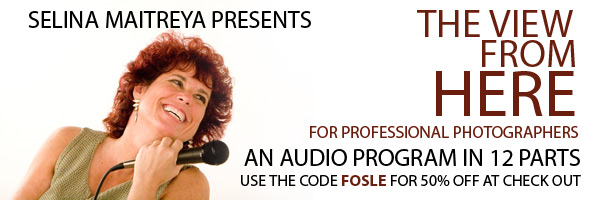
I think there is a disconnect when we use the statement, “It’s not about the gear” and it is the root of the challenge we face here.
Look, gear is cool. Gear is fun. And there are some pieces of gear that are definitely needed to make imagery. And better gear makes it easier to make specific images. But when we are talking about general photography, I think that making an image is so much more about the vision. Gear is about the technical, and there are times when the gear can make creating the image a smoother, easier operation.
Brian states it this way: “I will agree with one unequivocal and indisputable truth: no amount of gear can be a substitute for raw talent and vision. Just because you have the newest camera with the sharpest lens will not give you a guarantee that all of your shots will be memorable or provocative or even marginally good. But, I can guarantee you that it will help.”
I agree with the this statement with a couple of important caveats… Brian is stating this with the end product in mind. He is expecting a specific outcome. So when he states “I can guarantee you that it will help” he has already set the parameters of acceptability. He is referring to specific outcomes without taking into account that those outcomes are artificially determined by his statement.
What if the photographer doesn’t care about sharpness or has a different view of what ‘good’ is? What if the photographer wants to make moody, incredibly dark, muddy images that have a totally different point of view? What if the “best gear” for making that shot is a Holga ($28 at Amazon)? Great gear? A plastic camera? Not when compared with a D7, or a 5D MKII? But they would suck for doing what that photographer wanted to do… so the RIGHT GEAR is substituted. And to know what the right gear is, we have to know what the vision is.
When we say that vision comes first, that means that before you even know what gear you need, you should be finding out what you want to shoot. How do you want to shoot something? What do you want to say about the subjects you are photographing? What is the outcome you want to achieve with the work you are doing?
Vision.
Here is my scenario on gear.
Can a photographer who is competent make an image on any camera? I think they can. I think I could hand a Holga or a Canon S90 or a P&S Kodak $80 camera to Chase Jarvis, Jake Chessum, Andrew Hetherington, Joe McNally and Brian Matiash and they could make images that would be remarkable. They would already have the vision, they would now simply apply that vision to the limitations/parameters of the camera they are using. And they would make remarkable images.
However, I could give a 1DS MKIII with a 70-200MM L to someone who was a ‘snapper’ – a GWC… – and I am not convinced at all that their work would improve. The images may be sharper, and the colors cleaner… but the vision would not have improved. My point is that the guy who was previously shooting crap on his Rebel is now shooting crap – but needs a whole bunch more storage to keep the images. Nothing will improve.
Now that may sound like I am saying that gear doesn’t matter at all.
Nope, gear is important. For the vision that is created – and the ability to further that vision. Here are a few examples:
A photographer whose style includes shooting natural light headshots may naturally evolve toward a camera that would provide the best capture, and those fast lenses would be something that would help bring the vision forth. (And I bet that photographer was making good photos with what they started with, or there would be no evolving.)
A photographer who wanted to shoot architecture, or still life would greatly benefit from having a couple of tilt-shift lenses. They aren’t cheap, they are specialized and they are pretty darn well important for those choices in work. (And I bet if I gave those photographers an assignment and a P&S, they could get some cool shots.)
The argument that photographers who espouse the philosophy that “It isn’t about the gear” also have great gear is to miss the main point. If one has great vision, one can become as successful as one wants… bringing with it the perks of the best equipment. A photographer like Joey L may state that it isn’t about the gear while shooting a Hasselblad in Africa. They have nothing to do with each other. Joey has earned the Hasselblad… and could also do great work on a 5D MKIII. Does anyone think that the images Joey brought back from Africa are simply good because of the camera? I hope not.
Those images are a result of Joey’s vision. The gear makes it easier. The gear makes a bigger file. The gear is simply wonderful to use… but the vision is there first.
I am frustrated sometimes. I meet photographers with tens of thousands of dollars worth of cameras and lenses and absolutely no idea of what an image is. Not a capture… click the button – capture. Focused, accurately exposed, and somewhat framed. But without any vision at all. The vision is the thing that separates the capture from the image. I think it comes from the new tools not requiring pre-vision to make the image. We don’t choose film any more, nor do we work the focus with our hands. We don’t have to make choices on development, or processing, or what paper to print it on.
And we start to then put more emphasis on the gear – because the gear does so much. And maybe we should start to think more of the image than what it was created on. That may not be a popular thing to do, and God knows what would happen to the hundreds of forums out there where the discussion of the best lens dissolves into name calling and more… sigh. (Best lens… for what?)
“As you use your gear, and eventually start to plateau with its capabilities (and limitations), you will reach an impasse. You will hit a point where your vision can no longer necessarily be realized with the gear that you have. This is when you will decide whether it is worthwhile for you to invest in better gear.” – Brian.
Yes. This is exactly right. But I think it goes farther to bolster my argument than Brian’s. With the vision, the work grows. As it grows, the “Right Gear” begins to make sense, and make the vision go even farther. But it is worth noting once more, that the vision preceded the ‘gear’.
I am not a gear snob. I shoot Profoto, Dynalite, Norman’s and Canon. My lenses are “L’s” and my accessories are the best that I can get. I have C-stands, booms, and a ton of modifiers. I also have a studio with a full coved cyc, big enough to shoot a pickup truck in – with a full cove ceiling. I also have Hasselblad, Toyo, Bronica, Mamiya and Deardorff cameras. I shoot on all the cameras… sometimes because of a reason… and sometimes because it is simply fun. And no one will take my beloved Nikon’s from me. I rarely shoot 35MM film, but I love those cameras. I think the whole bag is worth about $100… heh.
I also shoot on my iPhone (which I just use for the camera… no phone service. I have Droid for the phone.) And I shoot Holgas, and little Kodak P&S’s.
My vision doesn’t require a specific camera… unless it does. That make sense I hope. It means that I love to take images on a camera that gives me very little latitude. And I love to make images on cameras that give me the specific needs I must have to make those images. I love shooting with my Profotos, but I can make images on Home-Depot work lights with a shower curtain. And do on occasion. Brian points out that as his vision for HDR grew, the need for a camera that would handle the demands was necessary… and he has that just right. The vision led to the gear.
So to wrap up, yes… gear matters to make the technical side better/easier/diverse. But that gear is a response to the vision. And the vision only comes with making more and more images. With whatever camera one has.
—-
Thanks to Brian for writing the original article and getting the discussion going.
I hope if you are considering a workshop this year that you take a few minutes and check out Learn to Light. We are heading all over the country for the rest of the year. See if we are coming to your town. We have kept the cost to a minimum in order to reach more people. I have a FaceBook page here, and you can stalk my every move at Twitter.
See you next time.

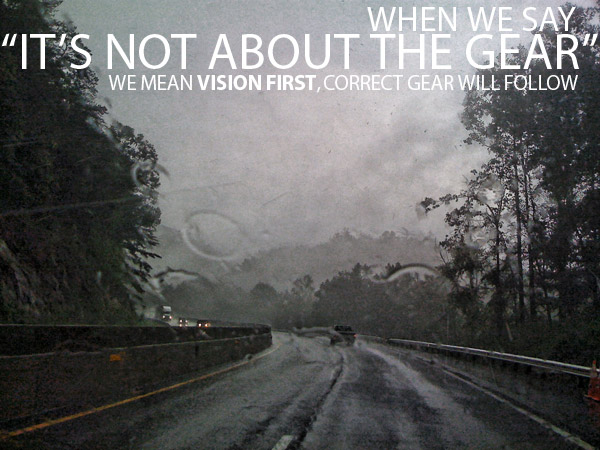
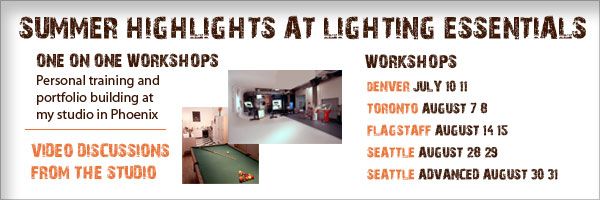

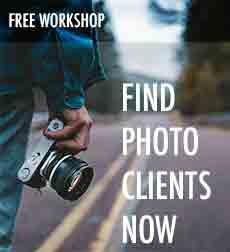
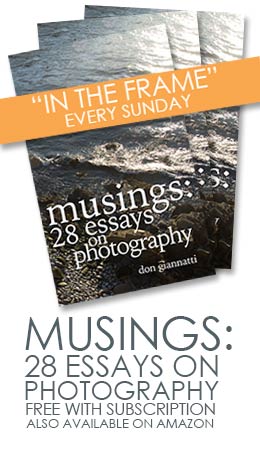

That is what I was trying to say in my two paragraphs on Brian’s post. Better articulated. Thanks.
Don,
First off, thank you for taking the time to write such a methodical alternative take on the epic ‘Gear’ debate around our mutual love of photography. There were a lot of points that you made that I certainly subscribe to.
You made a statement, “My vision doesn’t require a specific camera… unless it does,” that resonated extremely clearly with me. If I had to boil down the spirit of what I my intentions were in my piece, it would be that statement. I would never, ever condone the thought that the gear will take precedence over the vision. Vision doesn’t come in L glass or with the amount of megapixels on your camera sensor.
And I do agree with your theory that if you give the likes of Joe McNally, You, or Joey L any old camera capable of recording an image onto a digital media card or a slice of film, all three of you would create something magical because of the vision that you have crafted over years of shooting with whatever you had at your disposal at that time. The reciprocal to that is, as we have both stated, your vision will also dictate when you simply need better gear to get exactly what you are expecting to get.
Part of my argument is that it is not all that far fetched to postulate that gear can lead to vision. Take, for example, the Canon 15mm Fisheye lens. I dub this piece of glass ‘The Funk Buster’. It’s a specialized, niche lens that you really can’t craft a vision around unless you actually have one and use it as often as it is in your disposal. Same could be said for macro lenses. Or a lensbaby. These niche lenses can be lent to the creation and refinement of vision. What you learn from these lenses could possibly be co-opted in how you use your existing ultra-wide or telephoto lenses.
In the end, what matters most to me (for myself and anyone else who loves photography) is that you find whatever it is that gets you out there shooting. If it’s a new lens that you got or because you have an itch to capture a very specific idea, get out there and shoot. You can’t have a crutch if you don’t have a leg to stand on.
Thanks for the insight and through provoking volley, Don. This has been a real treat.
Brian
Well said and reasoned.
I think the best protection against gear for gear’s sake is that after you have a baseline, every incremental purchase should be for a specific image you intent on taking, and because you know specifically why this new piece of gear will help you take this image in a better way. If you can’t articulate that, well, then maybe you don’t need that gear. You could still buy it, but then you have to be clear that it’s just candy and not gear.
Sometimes it’s because that gear can help you achieve specific lighting or specific framing with the camera, or a specific feel to the image. Other times, that gear can offload your brain from a task so that you can focus on the subject. Whatever it is.
All that said, and this may be a controversial statement, I think the people everyone has in mind when they talk about gear heads, are in fact not photographers but mechanical engineers (illustratively speaking). It’s actually not about taking great photos, the photos are just a purpose for the gear to exist. But for them personally it’s really about the specs of the gear, or a feature. Not the actual artistic process. As long as there are 33MP of data, they’ll be happy.
Now before we bad mouth all of the gear heads, I think every photographer should appreciate the fact that all gear head’s voluntary and voracious appetite for expensive new gear has in fact lowered the cost of high tech gear for everyone and has pushed the boundaries of what camera and lighting companies can afford to develop and sell. So thank you, we appreciate the service!
Where it does become awkward is that the general public doesn’t know the difference and it has influenced the perception of photography overall. That is probably a bigger issue in the genres where the public is the client, as opposed to commercial genres where folks do understand the difference.
Thanks to Brian and Jan.
But do understand that I am NOT attacking gearheads. At all. I hope to reach them to show them something that they may be missing, but I am way too libertarian to try to ‘change’ them or denigrate them in any way.
If someone finds true happiness in buying all kinds of gear and trading up and such, that is certainly fine with me. My point is that it won’t necessarily make you a better photographer. It may still make you happy… and that is great.
Anyone who has tried to put together a portfolio knows how hard it is to develop a vision and a style. And creating a body of work in that style is terribly difficult and challenging.
I love photography too much to ever tell someone they shouldn’t be involved. I only want to guide up, not cast stones.
Hey Don,
I never got the impression that you were attacking gearheads. Quite the contrary. I do stand by the philosophy that gear should be earned and ‘grown into’. If there is to be any limitation, any at all, it is that your vision may be limited by your gear. The more you refine your vision with whatever you have at your disposal, the more it will help you dictate whether to go down the path of new glass, new camera, etc.
I was standing with my buddy in B&H a few months ago. We were in line waiting to buy a new tripod. There was a couple in front of us and we overheard them speaking with the sales rep. The guy was a self-admitted casual shooter. He wanted something, and i quote, ‘would take nice pictures’. He bought a Leica M9. Sigh.
My caveat to the gearheads out there is to not get overburdened by the specs. I’ve had tons of discussions about how this lens or that camera is limiting because of the inherent chromatic aberration or the poor low-light handling, and it definitely takes its toll. People get dissuaded from using their gear just by knowing that there is better gear out there and that is a little tragic.
Another way of looking at what I wrote is that it is important to know when new gear is appropriate. A lot of what I’ve read from the other pundits out there give the impression that it isn’t really needed. I prefer to take it a step back – to teach and to learn how to handle your vision so that you are able to effectively differentiate between the want and the need.
I think it would be truly advantageous if one of the pros out there blogged about “Here is my 200/f2. It’s a $5000 lens and here is how I rock it out.” If we agree that we should let the vision dictate the gear (to a degree) then it would prolific to share with the world what a $5000 lens has done to foster your vision. That is exactly how I attack it whenever I talk about my beloved 17mm T/S lens.
Bottom line, just take some freakin’ pictures already. 🙂
Don,
. . . absolutely thoughfully and meaningfully discussed by you and Brian.
Unfortunately, it won’t end the bantering on so many other forums. Just like there are so many photogs who spend a huge amount of money on gear that does not improve their work, there are huge numbers of them who spend untold amounts of time on those forums bantering back and forth trying to prove their answer to this question is the right one. I have seen profiles from some of these “debaters” that show 8,000 posts over a two or three year span. When do they ever find time to shoot?
Great rebuttal, Don. Really well thought out and got my gears turnin’.
I want to say that l think you’re not staying as open minded as you could be about the topic.
When your side says…”it’s not about the gear”…it’s shades of gray. We mean vision is most important. There’s leeway. It’s not JUST not about the gear…it’s also about vision. We’re to assume that obviously you meant vision is still paramount.
But when the other side says “Are you sure it’s not about the gear…because we think it is”…then it’s only black and white for us. We ONLY mean gear matters. No leeway. We’ve just got a non-starter. That we’re missing the point on vision.
I think both sides are intelligent enough to not just have a black and white take on it.
Yes, Joey L could probably make some amazing portraits with a disposable point and shoot or a Holga.
The point he…he doesn’t. No one wanting to be taken seriously does.
Yes, Jarvis put out and entire book about using the Best Camera app with some gorgeous photos. Labor of artistic love? Or pretty smart way to sell the shit out of his new iPhone app?
So while, yes, I do feel like (and totally agree with you on this perfectly said statement)..you need to *earn* that gear with your ever improving skill and ever reaching vision….
Someone needs to say to fledgling photographers out there who someday wish to be taken seriously and possibly make a living if not a name for themselves with their photos…..
It’s not about the gear. Until it is.
Thanks, Peter.
“The point he…he doesn’t. No one wanting to be taken seriously does.”
But that is also the point. And not.
The point is that Joey didn’t NEED to shoot it on Hasselblad, he chose to. And the choice doesn’t make the images aesthetically better (unless seen in print large, of course) – but that is tech and presentation. The images I have seen are gorgeous – and about 700 pixels wide. I could no more tell they were shot on a Hassy than a Rebel at that resolution.
But the images were stunning.
There are many many serious photographers working with cameras that are not “state of the art”… so the statement that you made about “not being taken seriously” may have some challenges.
Matt Mahurin
Syvlia Plachy
Richard Renaldi
Dahwoud Bey
Troy Paiva
All quite serious photographers… and I could go on and name a hundred more. Ranging from Holgas (Mahurin) to reconditioned Rolleiflexes (Plachy) the work they do is outstanding. A very serious art photographer I know shoots on a 20D. Because for his vision and his presentation, that is all that is needed.
I think the point that is missed is that photography can be a lot of different things. Can one shoot architecture in the style of “Architectural Digest” without the best gear – gear that is MADE to do what needs to be done? Of course not. That is exactly the point though… to understand the vision and the style of AD had to come first.
One doesn’t simply walk into a camera store and purchase a Linhoff system and 20K worth of strobes and then go set up a shot of the penthouse of Trump Towers, blending the ambient evening sky with the stobes in the room.
The vision comes first. Then the gear.
If it were opposite, then the gear would matter at the beginning of a photographers journey. I only have to direct you to Flickr and ModelMayhem to see billions of totally awful images shot on 5DMKII’s and D7’s and Profoto’s and Elinchromes…
The images are sharp, and the skin tones are smooth and the ‘bokeh’ is all that and more.
But the image? Well… maybe not so much.
So I will remain with my statement that first one must know what one wants to shoot, then one gets the gear that allows him/her to make the images that they want to shoot. That gear can be whatever it needs to be. (For Matt Mahurin. it is Holgas. For Terry Richardson it is P&S’s, and for Joey L it is Hassy’s and tons of gear. No right or wrong here… Matt’s Holga images may be seen as being ‘about the gear’ since the gear plays such a role in the imagery.
But that is a far cry from the forums where I see people making judgment calls on the value of the camera involved instead of the image at hand. And that is to be expected, for sure. It is far easier to attain a Hasselblad system and $40K worth of Profoto than it is to establish and define a vision.
If it was easy, everybody would do it.
Wait…. uh…
I’ll settle for that beautiful statement…
“The vision comes first. Then the gear.”
All of these other arguments seem to make it sound like vision is it…that’s all ya need.
And I just think it’s gotta be a little bit of both.
Pros (I won’t say all..but a great majority of them) and the camera companies acknowledge this but pushing forward with new and better technology.
I was finally able to upload the results of my recent photo shoot work shop. My computer’ registry has been causing the hold up preventing me from uploading the pictures in aregular manner. It was a good thing that there are applications for registry cleaner to help resolve computer registry issues.
Thank you for sharing this wonderful insight it has truly inspired me to do even better with my current activities.
Absolutely correct Don, for me it comes down to ‘appropriate’ gear to enable me to take the shots I see in my head… And as an Amateur with a limited budget for my hobby I sometimes (often!) have to use my brains to work around restrictions to enable me to produce the image I want. I don’t have any issue with – the fact that you have to ‘see’ before you shoot means that someone with more money than I have can’t just buy good images by getting great equipment. Sometimes you can pick up a real bargain by buying 2nd hand from someone who thought they could!
Don,
Great post and discussion. I appreciate the actual presence of critical thought.
This has raised some other questions for me.
1 – How do you define a great image? what separates the work of folks like Jarvis and McNally from the dross found in so many places?
2 – How does one develop, nurture, and expand vision?
If you have addressed these questions elsewhere please excuse my ignorance and point me in the right direction.
Thanks for sharing your knowledge and insight.
Excellently thought-out and written articles, both of them.
I had recently blogged about the same concepts.
Photography is an Art, the Photographer is an artist.
Shouldn’t any artist aspire to get the tools that will help them realize their vision?
As an artist progresses in skill, better gear will AMPLIFY the talents which they have worked to develop.
Let’s apply that concept to other artists:
Eric Clapton COULD play a $100 Guitar to a sold-out concert. And he would rock. But he sounds even better on a $10,000 ’65 Gibson SG. It’s suited to his skill.
Michelangelo COULD have painted the Sistine chapel with my little sister’s watercolor set…. and so on.
You can wear Michael Phelps’ Speedos, it’s not going to help you swim any faster.
Arguments for the other side? Yeah, VR is going to help a shaky hand, producing sharper pictures.
An FX sensor will produce cleaner images at higher ISOs. A larger megapixel count will make larger images. But if your current pictures already look like mediocre crap, upgrading will only produce less noisy, larger, more detailed mediocre crap. Tack sharp crap.
I wholeheartedly agree with Brian’s bottom line though:
“Bottom line, just take some freakin’ pictures already.”
The time we waste wondering if we’re worth our gear or vice versa is time we could be out ACTUALLY MAKING PICTURES.
—
Some excerpts from this post: http://joshliba.wordpress.com/2010/06/17/its-not-the-camera-its-you/
Read more at blog.joshliba.com
“But if your current pictures already look like mediocre crap, upgrading will only produce less noisy, larger, more detailed mediocre crap. Tack sharp crap.”
LOL… yeah, there is always that.
–don
Don…you been looking at my mediocre portfolio again?
geezzzzz
Well said as usual…articulated thought on your part
The late, great, architectural photographer Julius Shulman would not even allow his students to bring a camera to classes until ‘vision’ was discussed thoroughly first. Great article.
Also… I don’t know about you – but I’ve never walked into a restaurant and asked to see the chef’s knives or mixing bowls because the meal was great.
I have a tiny, crappy little Sony point and shoot, $80 from Walmart, that I bought just to keep in my pocket. Any camera is better than no camera when I can’t carry my DSLRs.
The shutter lag makes me pay a lot of attention to what’s outside of the frame, so that I can anticipate a shot in time to capture it. The thing is also very slow to focus. This has actually taught me to be more observant no matter what gear I use.
Also, if I want a picture with beautifully soft golden-hour sun flares in it, the Sony is perfect. I can’t recreate this special effect with any of my L lenses, no matter how hard I try.
Don, this is probably the best articulation of this subject I have read to date. When I was starting out I was always immensely frustrated by these “its not about the gear” articles. They were almost exclusively written by long time professionals who had built up an arsenal of gear to cover every eventuality.
As you put it it is not just about the gear, as it is not just about the vision. Vision 1st yes but sometimes gear does become a limiting factor and that is the exact time you need to go and acquire it.
I remember when I 1st acquired an ‘L’ lens, it was a complete eye opener in terms of, well everything! Gear is very important but the lack of it should not be used as an excuse not to get out there and do the best you can with what you’ve got.
Cheers
John
Definitely the most eloquently presented viewpoint on the gear/creativity argument I’ve read. Amazing blog, and amazing read. Thanks for all your hard work.